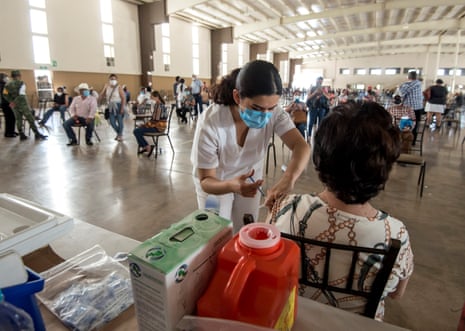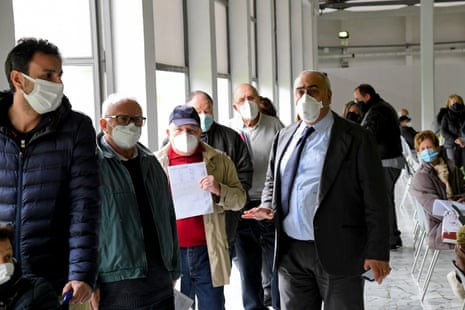
Merkel backs national lockdown in Germany – as it happened
This blog is now closed. For up to date coverage of the coronavirus pandemic, head to the link below:
Wed 7 Apr 2021 19.01 EDT
First published on Tue 6 Apr 2021 23.51 EDT- Summary
- Italy reserves AstraZeneca jab for over 60s
- A summary of today's developments
- Bolsonaro rules out national lockdown in Brazil despite highest daily death toll
- Merkel backs call for "short national lockdown" in Germany
- Belgium to restrict AstraZeneca jab to over 55s for a month after EMA findings
- South America now most worrisome region amid surging infections
- France logs new record number of intensive care Covid patients since beginning of the year
- Brazil records first case of South African virus variant
- Adults under 30 should be offered vaccines other than AstraZeneca, UK watchdog says
- EMA concludes blood clotting should be listed as 'very rare' side effect of AstraZeneca jab
- Any link between AstraZeneca vaccine and rare blood clots 'at limits of what is detectable', says former MHRA chief
- Today so far…
- Poland to extend Covid restrictions until 18 April
- Castile and León to suspend AstraZeneca shots to the under-65s pending further EMA clarification
- European Medicines Agency expects to hold briefing on AstraZeneca this afternoon
- India’s Serum Institute appeals for government financial aid amid vaccine export curb
- Brazil’s coronavirus death toll passes 4,000 a day for first time
- UK begins rollout of Moderna Covid vaccine in Wales
- Osaka expected to declare medical emergency amid case highs
- One in three Covid survivors diagnosed with mental health condition
- Australia says EU asked it to withdraw Covid vaccine export permit applications
- EU drug agency to respond to AstraZeneca blood clot concerns
- New Delhi under pandemic night curfew
- Summary

Live feed
- Summary
- Italy reserves AstraZeneca jab for over 60s
- A summary of today's developments
- Bolsonaro rules out national lockdown in Brazil despite highest daily death toll
- Merkel backs call for "short national lockdown" in Germany
- Belgium to restrict AstraZeneca jab to over 55s for a month after EMA findings
- South America now most worrisome region amid surging infections
- France logs new record number of intensive care Covid patients since beginning of the year
- Brazil records first case of South African virus variant
- Adults under 30 should be offered vaccines other than AstraZeneca, UK watchdog says
- EMA concludes blood clotting should be listed as 'very rare' side effect of AstraZeneca jab
- Any link between AstraZeneca vaccine and rare blood clots 'at limits of what is detectable', says former MHRA chief
- Today so far…
- Poland to extend Covid restrictions until 18 April
- Castile and León to suspend AstraZeneca shots to the under-65s pending further EMA clarification
- European Medicines Agency expects to hold briefing on AstraZeneca this afternoon
- India’s Serum Institute appeals for government financial aid amid vaccine export curb
- Brazil’s coronavirus death toll passes 4,000 a day for first time
- UK begins rollout of Moderna Covid vaccine in Wales
- Osaka expected to declare medical emergency amid case highs
- One in three Covid survivors diagnosed with mental health condition
- Australia says EU asked it to withdraw Covid vaccine export permit applications
- EU drug agency to respond to AstraZeneca blood clot concerns
- New Delhi under pandemic night curfew
- Summary


AstraZeneca on Wednesday said it was working with European and UK regulators to change the product information on its Covid-19 shot after authorities said they suspected possible brain blood clots were a rare side-effect of the shot.
The company said in a statement:
Both of these reviews reaffirmed the vaccine offers a high-level of protection against all severities of Covid-19 and that these benefits continue to far outweigh the risks.
However, they came to the view that these events have a possible link to the vaccine and requested they be listed as an extremely rare potential side effect [..] AstraZeneca has been actively collaborating with the regulators to implement these changes to the product information.
That’s all from me, I’m now going to hand over to my colleague Nadeem Badshah.
This from EU commissioner for health and food safety Stella Kyriakides on the video meeting of EU health ministers that is underway about the EMA’s recommendations regarding the AstraZeneca vaccine:
Important meeting with 🇪🇺 Health Ministers following @EMA_News presentation of their assessment of AstraZeneca vaccine safety.
— Stella Kyriakides (@SKyriakidesEU) April 7, 2021
Our decisions on vaccine rollouts should be based on science and with the safety of citizens at the centre. pic.twitter.com/w5RUdYJWfB
The AstraZeneca experience shows that our pharmacovigilance system works. But is essential that we follow a coordinated approach across the 🇪🇺.
— Stella Kyriakides (@SKyriakidesEU) April 7, 2021
We must speak with one voice across the EU to improve public trust in vaccinations.
Mexico’s government reported 5,499 new confirmed cases of Covid-19 and 596 more fatalities, according to data from the health ministry published on Wednesday, bringing the country’s total to 2,261,879 infections and 205,598 deaths.
The government says the real case numbers are likely significantly higher, and separate data published recently by the health ministry suggested the actual coronavirus death toll may be at least 60% above the confirmed figure, Reuters reports.

The Dutch government is working on plans to reopen café and restaurant terraces from 21 April and to allow shops to open more fully, broadcasters NOS and RTL said on Wednesday, quoting sources in The Hague.
Dutch News reports:
The curfew, introduced in January, could also be scrapped from that date, NOS said. Any relaxation of the rules depends on coronavirus infection rates, which have been dropping in recent days.
NOS says the measures were discussed by key members of the cabinet on Tuesday and were also raised in the regional safety board talks earlier in the week.
A number of city mayors have publicly called on the government to open cafe terraces in a bid to improve crowd control as the Dutch head outside to enjoy the summer.
Other rule relaxations on the horizon include allowing universities and colleges to resume more normal teaching, and to expand the options for secondary schools and after school clubs.
The number of visitors to private homes many also be increased from one to two. The plans are now being looked at by government health experts in the Outbreak Management Team, NOS said, and the OMT will report back to the cabinet on Sunday.

Italy’s government, the country’s main unions and employer associations said on Wednesday they had signed a protocol to organise the administration of vaccines in workplaces, as Rome steps up its vaccination plan.
Reuters reports:
Companies are eager to resume full activity in Italy, one of the European countries worst-hit by Covid-19, after businesses have been heavily impacted by the restrictions that Rome has imposed for over a year to stem the contagion of coronavirus.
Under the agreement, companies or groups of companies can submit their plans for voluntary employee vaccinations to local health authorities and make premises and internal medical staff available to do so.
Alternatively, companies will also be allowed to sign agreements with private medical service suppliers to have their employees vaccinated.
While health authorities will still provide the vaccines - once doses are available - needles, syringes and specific training for staff, employers will bear the costs of setting up and managing the vaccinations.
Italy has said it aims to vaccinate at least 80% of its population by the end of September, following criticism about the slow rollout of its campaign.
As of Wednesday afternoon, 11.6 million shots had been administered in the country, with 3.6 million of its 60-million-strong population having received the recommended two doses.

Germany’s Robert Koch Institute (RKI) is concerned about the increasing spread of coronavirus in nurseries and schools, Zeit reports.
“The number of Covid-19 cases is increasing again in all age groups, but particularly strongly among children and adolescents,” says a newsletter from the institute.
Adolescents were “also increasingly [driving] transmissions”, it added.
In those over 80 years of age, infections have also resisted a national downward trend that lasted for weeks. The number of outbreaks in old people’s and nursing homes has decreased however.
In the majority of infections, the location of transmission is not known, the RKI report continues.
Outbreaks currently particularly affect private households, but increasingly also daycare centers, schools and the professional environment.
Belgium to restrict AstraZeneca jab to over 55s for a month after EMA findings

The Belgian government has said it will restrict access to the AstraZeneca vaccine to just those people over 55 in light of the European medicines agency’s advice that blood clots are a potential side-effect of the jab.
Following discussions with officials at the EMA and a interministerial conference call on Wednesday, the government said it will impose the restriction for a month.
The EMA announced on Wednesday that the rare blood clots would be listed formally as a side-effect of the AstraZeneca vaccine, but it did not announce any restrictions on use of the vaccine.
The EMA’s executive director Emer Cooke had said the regulator could not identify the cause of the blood-clotting event, which was mostly, but not entirely, in women under the age of 60.
Belgium has been one of the few EU member states not to restrict use of the vaccine. The impact of the change in policy will not be significant, however, as the country is only slowly moving through the age groups.
Just 12.4% of those between 50 and 59 have received a first jab and the proportion drops to 10.6% for those aged 25 to 49.
South America now most worrisome region amid surging infections
South America is now the most worrying region for Covid-19 infections, as cases mount in nearly every country, the director of the Pan American Health Organization (PAHO) said on Wednesday.
Reuters reports:
“Nowhere are infections as worrisome as in South America,” director Carissa Etienne said during a weekly news conference.
Brazil has seen the most merciless surge. Scientists forecast it will soon surpass the worst of a record January wave in the United States, with daily fatalities climbing above 4,000 on Tuesday.
“The situation in Brazil is concerning countrywide,” said Covid-19 incident director Sylvain Aldighieri. “Our concern at the moment is also for the Brazilian citizens themselves in this context of health services that are overwhelmed.”
Brazil needs access to more Covid-19 vaccines now and should be able to receive them through global partnerships, Aldighieri said.
[...]
Intensive care units are nearing capacity in Peru and Ecuador, and in parts of Bolivia and Colombia cases have doubled in the last week, Etienne said, adding that the southern cone is also experiencing an acceleration in cases.The United States, Brazil and Argentina are among the 10 countries seeing the highest number of new infections globally, she added.
The Americas recorded more than 1.3 million new coronavirus cases and over 37,000 deaths last week, Etienne said, more than half of all deaths reported globally.
The UK government on Wednesday sought to encourage people to continue getting the AstraZeneca vaccine, urging people who have had a first dose to show up for their second dose, irrespective of age.
A government spokesman said:
The Oxford/AstraZeneca vaccine is safe, effective and has already saved thousands of lives.
As the MHRA - the UK’s independent regulator - and the JCVI have said, the benefits of the vaccine far outweigh the risks for the vast majority of adults.
Everybody who has already had a first dose of the AstraZeneca vaccine should receive a second dose of the same brand, irrespective of age, except for the very small number of people who experienced blood clots with low platelet counts from their first vaccination.
The Government will follow today’s updated advice, which sets out that, as a precaution, it is preferable for people under the age of 30 with no underlying health conditions to be offered an alternative vaccine where possible once they are eligible.
When people are called forward, they should get their jab. Vaccines are the best way out of this pandemic and provide strong protection against Covid-19.
This from Keir Starmer, the leader of the opposition:
The AstraZeneca vaccine is safe, effective and saving thousands of lives.
— Keir Starmer (@Keir_Starmer) April 7, 2021
Trust in our doctors and scientists. When it is your turn to get the jab, do so.
My first dose was AstraZeneca and I look forward to getting my second dose when it is offered.